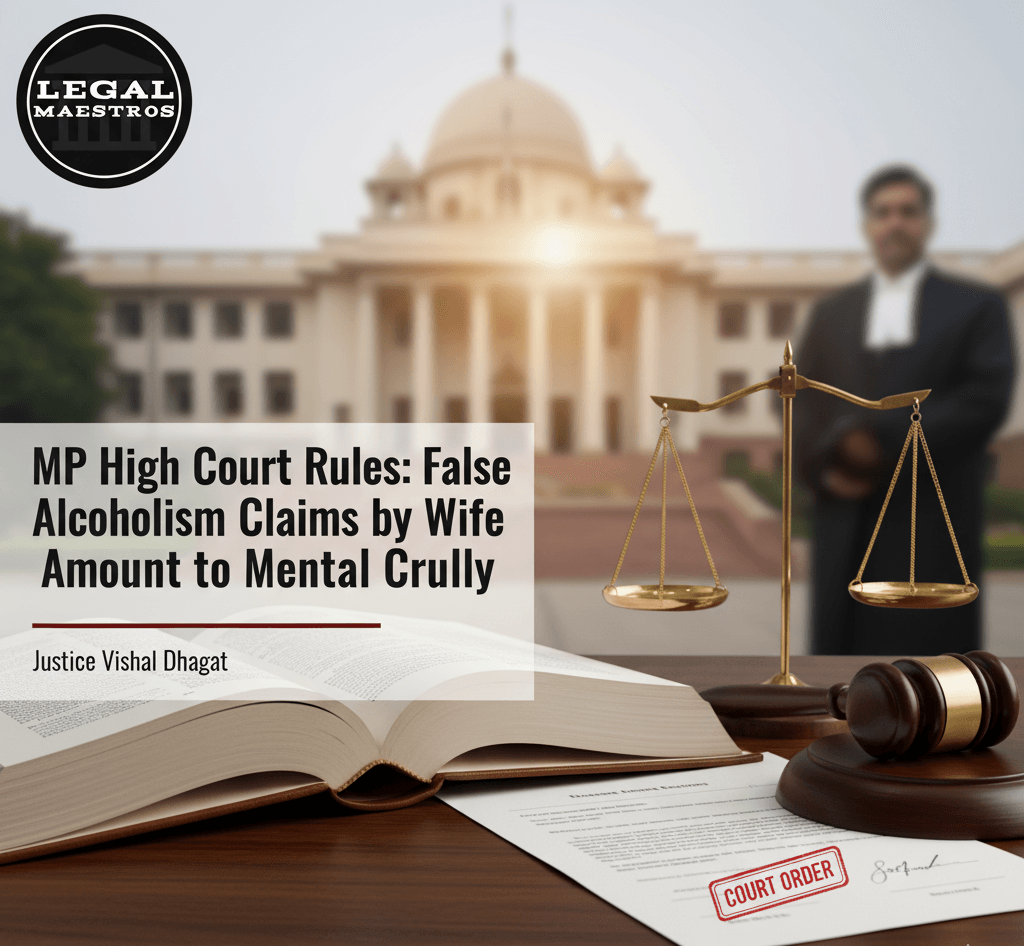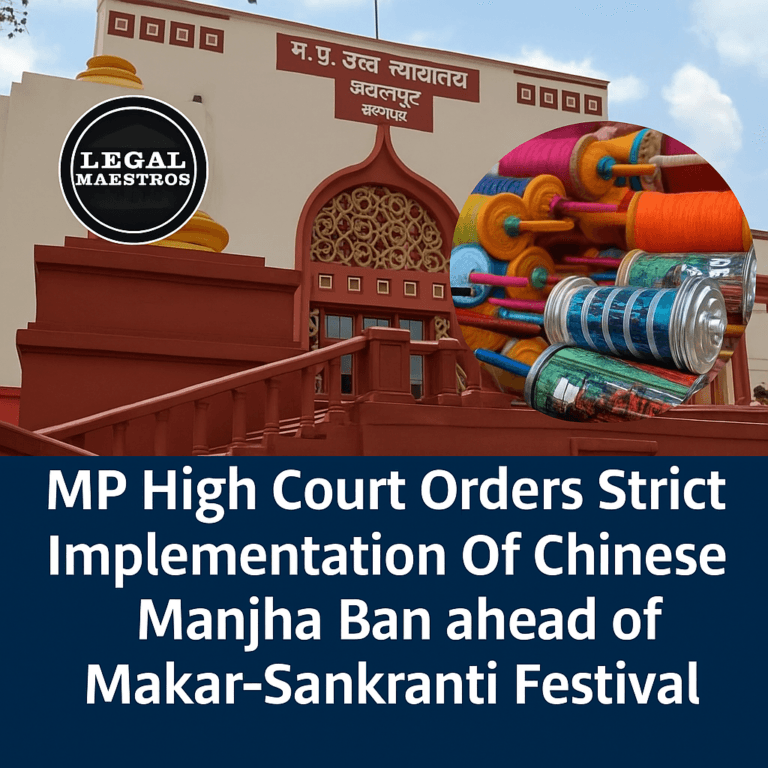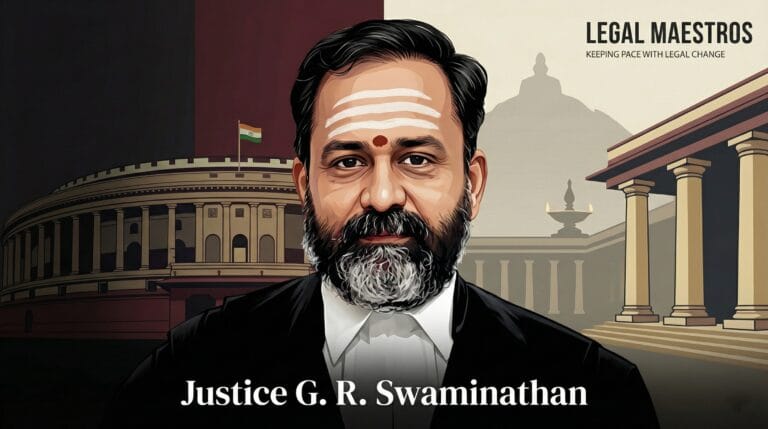
MP High Court Rules False Alcoholism Claims by Wife Amount to Mental Cruelty by Justice Vishal Dhagat
High Court Defines False Alcoholism Claims as Mental Cruelty
A key decision made by the Madhya Pradesh High Court is that constant and false allegations of alcoholism by a wife against her husband is a gross kind of mental cruelty. This ruling was given by a division bench consisting of the Justice Vishal Dhagat and Justice Anuradha Shukla which granted a divorce to a man. A previous ruling of a Family Court denied the plea of the husband but was reversed by the court. This verdict underlines that unfounded charges that harm the social status of an individual as well as his career cannot be viewed as normal marital misunderstandings.
In the case, it was a married man (a public servant) who had applied to be divorced on grounds of cruelty as well as desertion. The married couple, with two children, spends the last three years living apart since 2017. According to the husband, the actions of his wife were inhuman and she was constantly accusing him of false charges. The wife was also a public servant in an officer cadres who appealed against the divorce. She said that it was her, who had suffered cruelty and the husband was a habitual drinker.
Family Court in Mandla had initially ruled in favor of the wife and the husband was denied the divorce. That court had found out that the husband was actually a habitual drinker who had harassed his wife. Not agreeing with this finding, the husband appealed to the High Court. The further and more detailed analysis of evidence carried out by the High Court resulted in a very different finding, as it paid attention to the nature and weight of the unproved charges of the wife.
For any queries or to publish an article or post or advertisement on our platform, do call at +91 6377460764 or email us at contact@legalmaestros.com.
This ruling makes it clear when marital conflicts become normal and when they rise into levels of mental cruelty as per the law. The High Court has established a clear precedent by emphasizing on the public humiliation and ruining the name of the husband as a public servant. It confirms the principle that the cornerstone of a marriage is trust and that factless accusations at the character of a spouse, particularly in his/her social and business spheres can be the cause of a marriage being dissolved.
The Court’s Rejection of Alcoholism Claims
In its finer details the High Court thoroughly considered evidence that Family Court used to label the husband an alcoholic. The court ruled that the written statements by the wife had no evidences to prove her allegations that he was addicted to liquor. The judges observed that various critical documents such as those on a previous compromise did not even mention the husband being a habitual alcohol drinker.
The wife had provided evidence of a compromise which had been arrived at in the year 2011, in which the husband apologized to the wife because of his previous misconducts. The High Court however noted that nothing was on record that such behavior had been repeated in the subsequent years. The court concluded that the trial court had mistakenly used this settled matter to prove a present and continuing alcoholism habit. The husband in his sworn statement himself had refuted the whole of the wife on intoxication.
Moreover, another important weakness of the reasoning of the Family Court was noted by the High Court. The court below had used the testimony of the brother of the wife on an alleged incident at a reception. According to the High Court bench headed by Justice Vishal Dhagat, the particular incident was not even mentioned in the official written statements of the wife. This was one of the mistakes of using the civil law by relying on evidence that was not included in formal pleadings.
At the end of the day, the High Court held that the wife had made a hopeless attempts to prove any grain of truth to her grave allegations. The bench established that the trial court had made an apparent misjudgment by concluding that the husband was an alcoholic. In this utter inability to establish such a harmful charge was a major contributing factor to the High Court ruling to reverse the previous judgment and re-examine the case on the principles of mental cruelty.
Public Humiliation as a Form of Cruelty
The decision of the High Court did not merely prove the statements of the wife wrong. It concentrated on the impact of such unrelenting and untrue accusations. As noted by the bench, a consistent determined spirit of respondent-wife to ensure that her husband is mocked and humiliated in his social circle as an alcoholic is certainly no laughing matter. The judges contrasted such actions with ordinary bickering and quarrels that are supposed to occur in the normal married life.
The court observed that both the parties were employees serving in the government, albeit in varying capacities; the husband was an employee in Class IV position and the wife in an Officer Cadres. The insistence of the wife in pronouncing her husband as an alcoholic was interpreted as an attempt to embarrass him in front of everyone. This was something that the court mentioned that he was subjected to social disgrace and indignity since his social status as a public servant was compromised. This was considered a serious issue because such an assault on his dignity and career reputation.
According to Justice Vishal Dhagat and Justice Anuradha Shukla, a mental cruelty concept is not fixed, but there are new forms of cruelty which may arise with the human behavior. The case of the wife making baseless allegations in this particular case was perceived as an instrument to get out of her marital responsibility. She was coming up with a scenario that would not allow reconciliation and at the same time she was destroying his reputation by making him a fake alcoholic.
Such an unjustified accusing process was found to have an ex post facto effect on the relationship between the parties in the future. The court also reasoned that such conduct that attacks the very backbone of trust and respect in a marriage is a definite example of mental cruelty as provided in Section 13(1)(ia) of the Hindu marriage act. This gave the court grounds to proceed with the appeal by the husband.
The Ultimate Decision about the Marriage.
The High Court, upon its findings, gave a decree of divorce and gave the husband a chance to appeal against the ruling. The court found that the false claims of the wife to be an alcohol addict and her continued denial of cohabitation were acts of extreme cruelty on her part which was mental.








